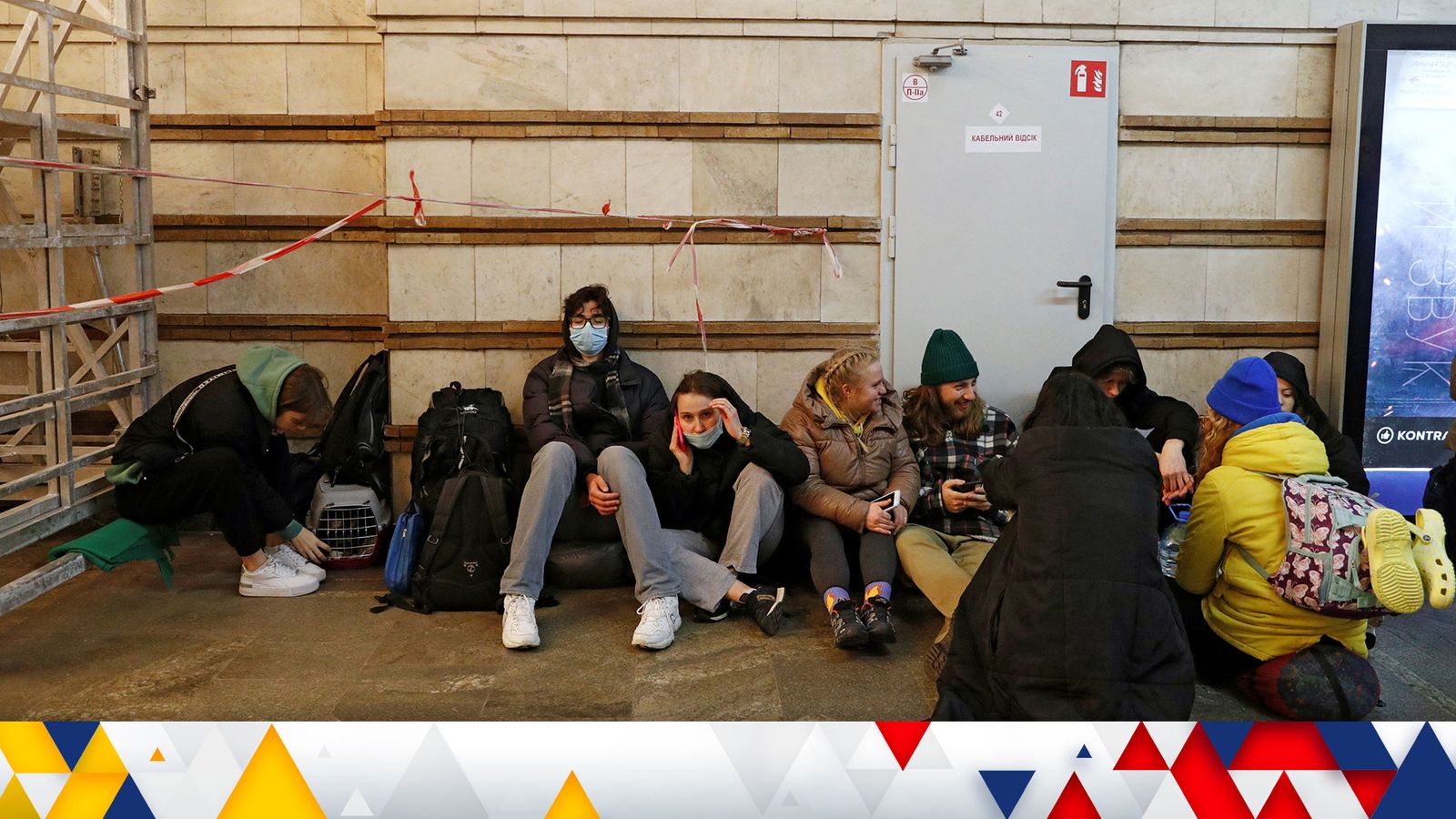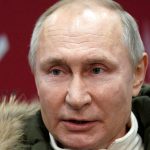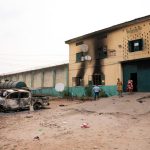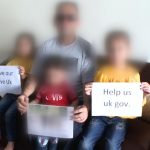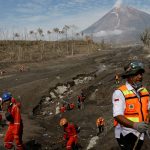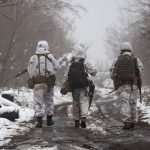Martial law was declared in Ukraine as Russia invaded, forcing Ukrainians to move into bomb shelters and long queues for blood banks.
As Ukrainians try to come to terms with their country being invaded by Russia on Thursday morning, Sky News looks at what the country is like for those who are there.
Martial law
Shortly after Vladimir Putin ordered the attack on Ukraine, President Volodymyr Zelenskyy declared martial law and cut diplomatic ties with Moscow.
Martial law is the temporary imposition of direct military control of normal civil functions or suspension of civil law by a government – especially in response to a temporary emergency or in an occupied territory.
It means Ukraine’s military is in control of the country, so they can react quickly to Russian aggression.
Follow live updates as Russia invades Ukraine
Ukraine: Air raid sirens blare out as explosions rock Kyiv, where a mass exodus is underway
Ukraine invasion: Boris Johnson unleashes UK’s ‘largest set of sanctions ever’ on Russia – Putin’s former son-in-law targeted
Russia invades Ukraine: Rises in prices of bread, meat, diamonds and gas – how the invasion will affect the UK
The Ukrainian president addressed the country on Thursday morning, saying: “Dear Ukrainian citizens, this morning President Putin announced a special military operation in Donbas.
“Russia conducted strikes on our military infrastructure and our border guards. There were blasts heard in many cities of Ukraine.
“We’re introducing martial law on the whole territory of our country.
“Today each of you should keep calm. Stay at home if you can. We are working. The army is working. The whole sector of defense and security is working.
“No panic. We are strong. We are ready for everything. We will win over everybody because we are Ukraine.”
Rises in prices of bread, meat, gas: How will Russia’s invasion affect people in the UK?
As the reality of the situation set in after years of Ukrainians preparing for a Russian invasion, many told of how scared they were.
Kyiv resident Elizaveta Melnik said: “I feel panic, scared and excited. I don’t know who I should ask for help.
“We didn’t believe this situation would come.”
Conscription
The day before Russia invaded, Mr Zelenskyy introduced the conscription of reservists aged 18 to 60 for a “special period”.
“We must increase the readiness of the Ukrainian army for all possible changes in the operational situation,” he said.
The maximum service period for reservists called up is one year.
Please use Chrome browser for a more accessible video player
According to the Ukrainian Armed Forces, there are 245,000 active personnel and 220,000 reserve personnel.
Russia’s military, by contrast, has 900,000 active-duty personnel.
Bomb shelters
As bombs hit Ukraine’s cities, air sirens sounded and people fled to makeshift bomb shelters.
The Kyiv government created a Google Maps list of bomb shelters people can search to see where their nearest is.
In Kyiv and Kharkiv, many sought shelter in Metro stations, bringing suitcases with any belongings they could fit in, as well as children and dogs.
Trains halted at stations were used by people so they could have a seat.
The head of the Ukrainian Greek Catholic Church, His Beatitude Sviatoslav Shevchuk, was hiding out under the Cathedral of the Resurrection in Kyiv with many other people, the Vatican said.
Please use Chrome browser for a more accessible video player
Giving blood
Mr Zelenskyy asked on Thursday morning for people to donate blood as there are “wounded soldiers in hospitals”.
Sky News saw huge queues at a blood bank in Kharkiv shortly after that.
A doctor at the clinic said the last time he saw the same scale of blood donation was during the 2014 Donbas conflict.
Queues for ATMs, petrol, water pumps and supermarkets
Long queues started forming early on Thursday in Ukrainian cities for various necessary services.
Please use Chrome browser for a more accessible video player
Harry Lee, an English national teaching teacher in Kharkiv, said he was woken up by bombs going off at 5.15am on Thursday.
He told Sky News: “This morning, lots of people were queuing at ATMs to get money out in cash.
“I do think with the ATMs that was mostly because people were worried about cyber attacks, people wanted cash as a way of being able to buy essentials later on.
“Lots of people queuing at water pumps to get water for cooking or whatever it may be.
“Massive queues for petrol and food shops, all the supermarkets, even the 24 hours ones are now closed or closing.”
Huge queues at blood bank in Kharkiv. Dr says last time he saw this scale of blood donation was during 2014 conflict in Donbas. #ukraine #kharkiv pic.twitter.com/CQMBSypIuA
Others reported ATMs running out of cash and some supermarkets refusing to take card payments.
Lines of cars waiting at fuel stations were seen in Kyiv, while traffic mounted up as people tried to leave the capital.
Some panicked and others clung to their routine, and as sirens sounded one resident said: “I’m not afraid. I’m going to work.
“The only unusual thing is that you can’t find a taxi in Kyiv.”
